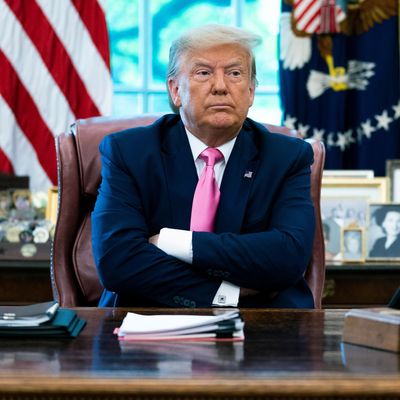
On Tuesday evening, President Trump threw the fate of one of the year’s most significant pieces of legislation into doubt by “asking Congress to amend” the $908 billion COVID-19 relief bill. The second stimulus package seemed like a done deal, having passed in both chambers of Congress after long-stalled negotiations, but then Trump issued a vague threat to reject the measure if lawmakers do not see to his requests, which include increasing the $600 direct-stimulus check to $2,000. The president’s declaration flew in the face of expectations set by his own aides, who apparently spent the day telling reporters that Trump would back the measure — only to learn he had taped the video at least five hours in advance, the Washington Post reports.
Trump could keep the stimulus bill from becoming law even if he doesn’t veto it in the few remaining days of the 116th Congress, as conditions are ripe for a rare “pocket veto” — which can’t be overridden. Further, because the COVID-19 relief bill was attached to a $1.4 trillion end-of-year omnibus spending measure to fund the government through September 2021, and because the government is currently operating on a seven-day interim spending bill that will soon expire, Trump’s potential veto or refusal to sign the stimulus package could trigger a government shutdown before year’s end. Here, some dates and deadlines to keep in mind as the situation unfolds in the coming days.
December 23: Deadline to Block “Pocket Veto”
Congress needed to get the bill to Trump before Christmas Eve in order to block the “pocket veto” option, as congressional reporter Chad Pergram explained:
Under normal circumstances, once a bill is sent to the president, he has ten days (excluding Sundays) to either sign or veto it. If he does not act during that time frame, the bill automatically becomes law. But if the current congressional session comes to an end during that ten-day window, the “pocket veto” comes into play. Since the president hasn’t formally rejected the bill and Congress is adjourned, it can’t initiate the veto-override process.
December 24: A Vote on $2,000 Checks?
On Christmas Eve, House Democrats tried to approve Trump’s request for $2,000 stimulus payments but they were stopped by Republicans. Democratic leadership in the House attempted to push through the proposal with “unanimous consent,” but House Republicans blocked the effort. In an attempt to counter the bid by Democratic leadership, House Republicans that day tried, also through “unanimous consent,” to pass a request to reevaluate foreign aid in a related omnibus spending package — another source of criticism for Trump. That effort was blocked by House Democrats.
December 26: COVID Aid Expires
Some coronavirus aid programs are due to expire on the 26th, including Pandemic Unemployment Assistance (PUA), which provides aid to workers who are typically ineligible for UI benefits, such as gig workers and independent contractors, and Federal Pandemic Unemployment Assistance (FPUA), which supplements state UI compensation with an additional $300 per week.
December 28: Government Shutdown?
On Monday, the seven-day interim spending bill that the government is currently operating on will expire. Since the COVID-19 relief bill is packaged with the omnibus spending bill that funds the federal government, Trump’s veto, or refusal to sign the measure into law by December 28, would cause a government shutdown.
A possible solution: The Senate is set to convene for a pro forma session on December 28 and, provided no lawmakers object, could pass another stopgap funding bill by unanimous consent to keep the government from shutting down, The Hill reports.
January 3: Congress Adjourns
The current congressional session ends. The 116th Congress must adjourn “sine die,” or without setting any future date to reconvene, by 11:59 p.m. on January 3.
As of now, the new 117th Congress is scheduled to convene at noon on the same day, a date specified by the Constitution. But due to pandemic-related planning complications, as well as the fact that the third falls on a Sunday this year, the schedule is reportedly subject to change. Whatever date the new body meets, if Trump hasn’t signed the stimulus package by then, Congress will have to start all over.






























